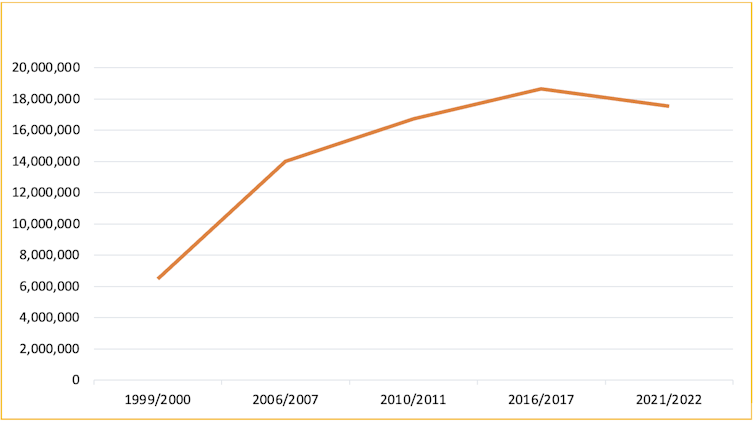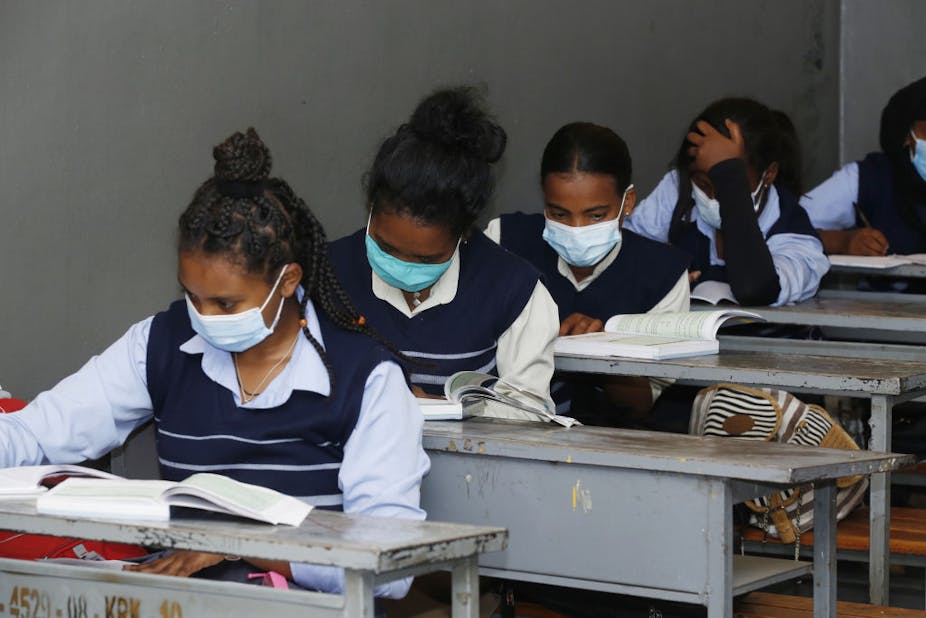In October 2023, Ethiopia’s minister of education, Berhanu Nega, disclosed several shocking figures on the outcomes of the 12th-grade national examination. Of the 3,106 schools that administered the 12th grade (secondary school leaving) examination for the 2022/23 academic year, 43% reported that none of their students had passed.
And, for the second consecutive year, more than 96% of students who participated in the national school leaving examination scored less than the mark (an average of 50%) required to pass. This means that hundreds of thousands of students could not qualify for university education.
For comparison, more than 1.6 million Nigerian secondary school students took the West African Senior School Certificate Examination in 2023. Approximately 80% (1.3 million) of them attained a passing grade or higher.
A robust education system is not merely about exam results. But these figures underscore the sad fact that Ethiopia’s secondary education sector is in crisis. This has been building for many years. In 2015/16, 49% of students scored 50% or more for the grade 12 examination. The following year the proportion dropped to 41%. A lack of consistent national data on examination results makes it challenging to fully illustrate the trend.

Ethiopia, like other nations in the region and globally, has grappled with learning setbacks resulting from the COVID lockdowns. This, combined with ongoing internal conflict since 2020, likely contributed to the most recent national exam scores.
However, the crisis has deep roots. As policy experts, researchers and longtime observers of the Ethiopian education system, we believe the shockingly poor exam results indicate underlying structural issues that extend far beyond the realm of individual student performance. They are also a perfect opportunity for all stakeholders – particularly the government – to tackle the structural problems holding the system back. Now is the time to embark on swift reform with commitment and vision.
Roots of the problem
The seeds of the secondary education crisis are planted early. Hundreds of thousands of children in Ethiopia continue to complete primary school without grasping the fundamentals of literacy and numeracy.
Read more: COVID-19 has dealt a blow to Ethiopia's private higher education institutions
This learning crisis stems partly from poor school infrastructure. Inadequate allocation of school resources following the massification of the education system is another problem. The rapid expansion of primary education seen in the past decade has considerably increased the proportion of students (and especially girls) from relatively disadvantaged backgrounds. That includes children from regions with historically low access to education, such as Afar, Benishangul-Gumuz, and Somali.

This impressive achievement in the expansion of primary education has substantially increased the demand for secondary education. The secondary gross enrolment ratio has doubled over the past decade, from 23% in 2011/12 to 46% in 2021/22. Although much progress has been made in terms of resource allocation, the education system still struggles with inadequate infrastructure and resources to match the rapid enrolment.
In addition, teachers were not properly trained to manage the significant change in student demographics. Preservice teacher training curricula and approaches to teaching need to be overhauled in view of the transformation of the Ethiopian education system from elite to mass education. Further, as the country’s new education policy acknowledges, there has been a disconnect between student learning experiences and the country’s broader societal goals.
But any changes to curricula and teaching methods must be done thoughtfully, in consultation with all stakeholders. Abrupt policy changes create confusion and disruption. For example, following recent policy changes, the government ditched the grade 10 national examination. This was initially set up to select students who would qualify for a two-year secondary education to prepare them for university education. In the absence of a viable mechanism to identify early academically underprepared students, it becomes impossible to provide targeted support in preparation for the national examination.
Challenges like under-resourced schools, unprepared teachers, outdated curricula, and political instability not only impede student learning. They also erode the nation’s human capital. A stark illustration is Ethiopia’s decline in the global human development ranking, from surpassing 22 countries in 1992, to outperforming only 16 after three decades.
To harness Ethiopia’s burgeoning youth population, the school sector requires urgent attention. Secondary education, beyond university qualification, is crucial for equipping young people with knowledge and skills required for a productive workforce.
Don’t waste a crisis
There has been widespread public fury about the recent national exam results. But these outcries come and go. The current crisis should not be a wasted opportunity. All stakeholders must seize the opportunity and deliberate on structural and systemic forces that underlie the mass failure in the 12th-grade examination.
As one of us has argued elsewhere, crisis makes swift reform possible – if key stakeholders seize the moment with commitment and vision.
Vietnam offers a useful example. Years of war and political upheaval pushed the nation to the brink of collapse. The Vietnamese education system grappled with a range of issues. These included a theory-heavy curriculum, outdated teaching and assessment methods, inadequate teacher quality, and high inequality. Then, a decade ago, Vietnam underwent a comprehensive reform of its education system. This has led to positive transformation in both its economy and society.
The Ethiopian government and other stakeholders should not waste a crisis. Now is the time to act, with a sense of urgency and purpose.

